Key takeaways:
- Imposter syndrome can affect anyone, regardless of their achievements, leading to self-doubt and anxiety about one’s accomplishments.
- Sharing experiences and vulnerabilities in supportive communities can foster connection and combat feelings of isolation among writers and readers.
- Practical strategies such as setting small goals, seeking feedback, and practicing self-compassion can help individuals overcome imposter syndrome.
- Books and online resources about imposter syndrome provide valuable support and encouragement in recognizing and addressing these feelings.
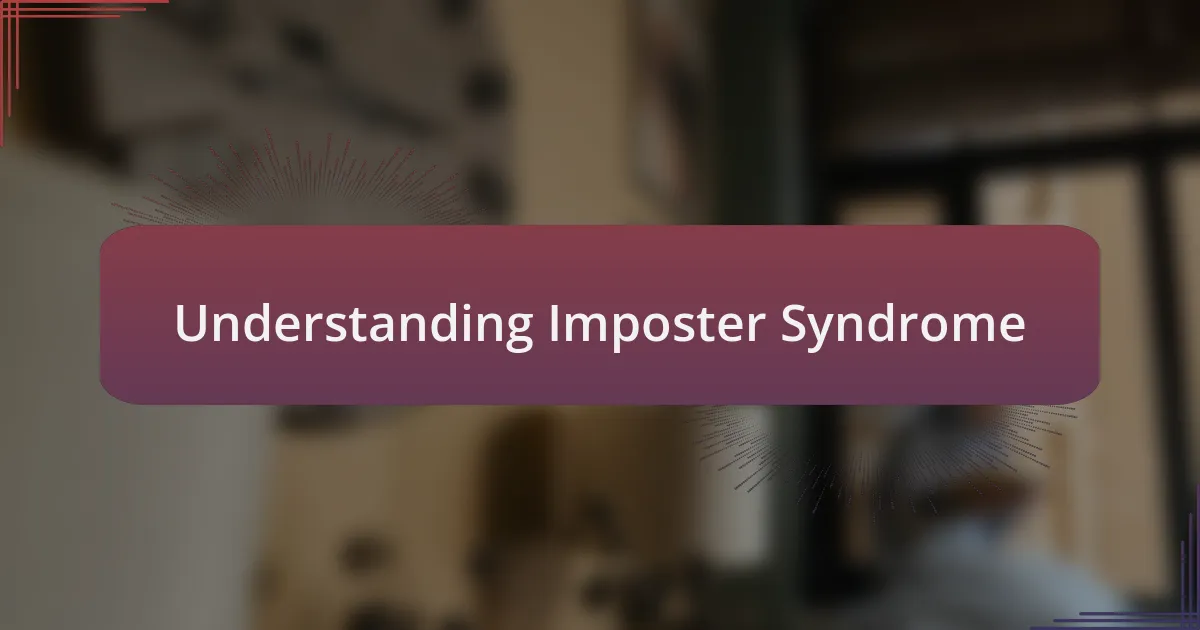
Understanding Imposter Syndrome
Imposter syndrome often creeps in, leaving us questioning our accomplishments and feeling like frauds in our own lives. I remember the feeling of standing in front of a group, all eyes on me, and thinking, “What if they discover I’m not as competent as they believe?” That internal dialogue can be relentless, pushing us to doubt even our most significant achievements.
Many believe that imposter syndrome is reserved for high-achieving individuals, but that simply isn’t true. I’ve spoken with friends from all walks of life who’ve grappled with this feeling, and it’s clear that it can affect anyone. It’s an emotional burden that can create a cycle of anxiety and self-doubt, leading us to dismiss our successes as mere luck or coincidence.
What’s fascinating is how this phenomenon can manifest differently for each person. I realized that while I often felt like I needed to prove myself to others, some friends battled with the fear of being “caught out” for even the smallest errors. This reflection made me wonder: if we all feel this way at times, could it be a shared experience that brings us closer rather than pulling us apart?
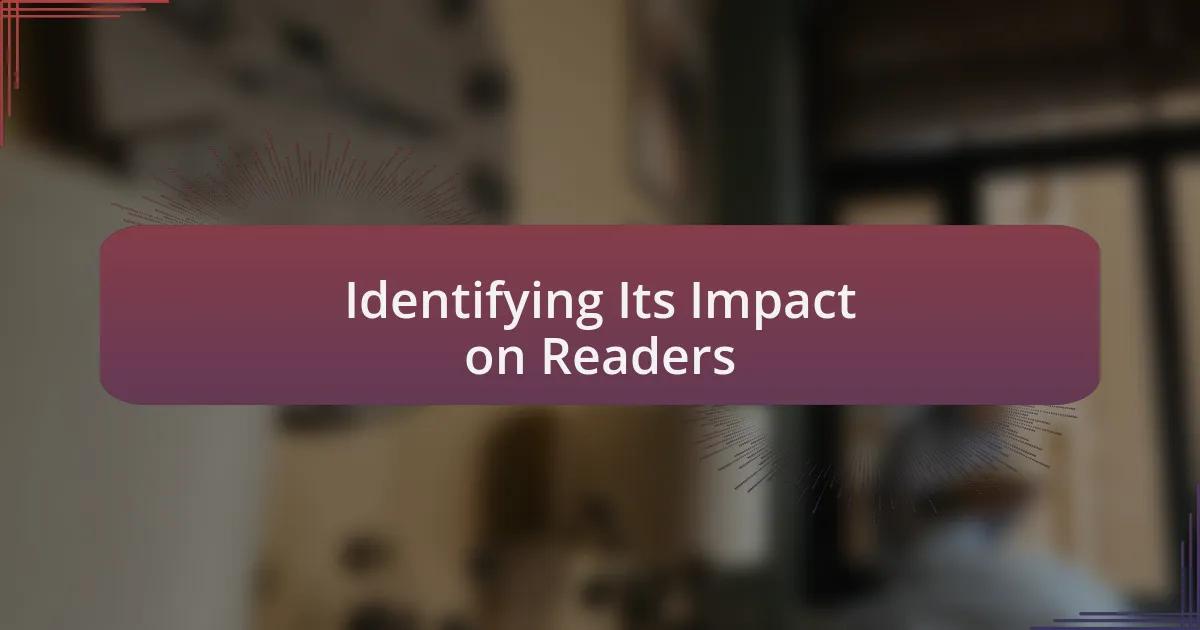
Identifying Its Impact on Readers
It’s striking to see how imposter syndrome affects the reading experience. I once noticed it in myself while diving into a complex novel; instead of savoring the story, I found myself critiquing my understanding. Was I missing something essential? This internal pressure dimmed my enjoyment and made me hesitant to share my thoughts with others, as if my opinions were somehow less valid.
In discussions with fellow readers, I’ve found that many grapple with similar feelings. They often dismiss their insights or avoid participating in book clubs altogether, fearing their interpretations will fall short. This hesitation not only stifles engaging conversations but also hinders the growth that comes from diverse perspectives. Isn’t it unfortunate that our fears can prevent us from connecting over shared stories?
Furthermore, the impact of imposter syndrome can linger long after the last page is turned. I recall feeling a wave of relief when I finally voiced my thoughts about a challenging book. The supportive feedback from others boosted my confidence, reminding me that our interpretations enrich the reading community. It left me wondering how many readers miss out on that empowerment simply because self-doubt holds them back.
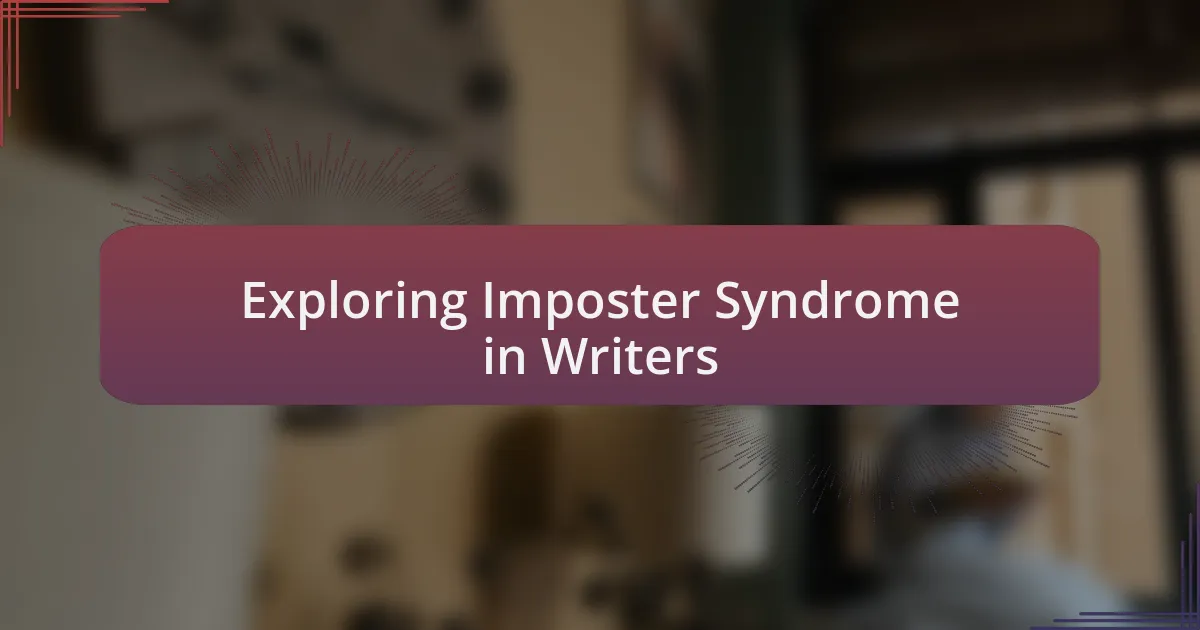
Exploring Imposter Syndrome in Writers
Writers often find themselves tangled in the web of imposter syndrome, questioning their skills and contributions. I remember pouring my heart into a manuscript, only to be plagued by doubts about its worthiness. I couldn’t help but ask myself: “Who am I to call myself a writer?” This self-doubt led me to compare my work to established authors, paralyzing my creativity and stifling the joy of writing.
In conversations with other writers, I’ve discovered that many experience this same struggle. A friend shared how she felt unqualified to submit her poetry, convinced that it would never measure up to the pieces she admired. Hearing these sentiments made me realize how pervasive the fear of inadequacy can be, and I couldn’t help but empathize with her plight. Have you ever felt that your voice wasn’t valid enough to be heard?
Even successful writers can wrestle with feelings of fraudulence, a fact highlighted during my attendance at a local author event. Listening to seasoned authors confess their battles with self-doubt was both comforting and eye-opening. It struck me that vulnerability can unite us, revealing the common ground we share despite our achievements. This made me ponder: What if we chose to embrace our imperfect journeys rather than let fear silence our stories?
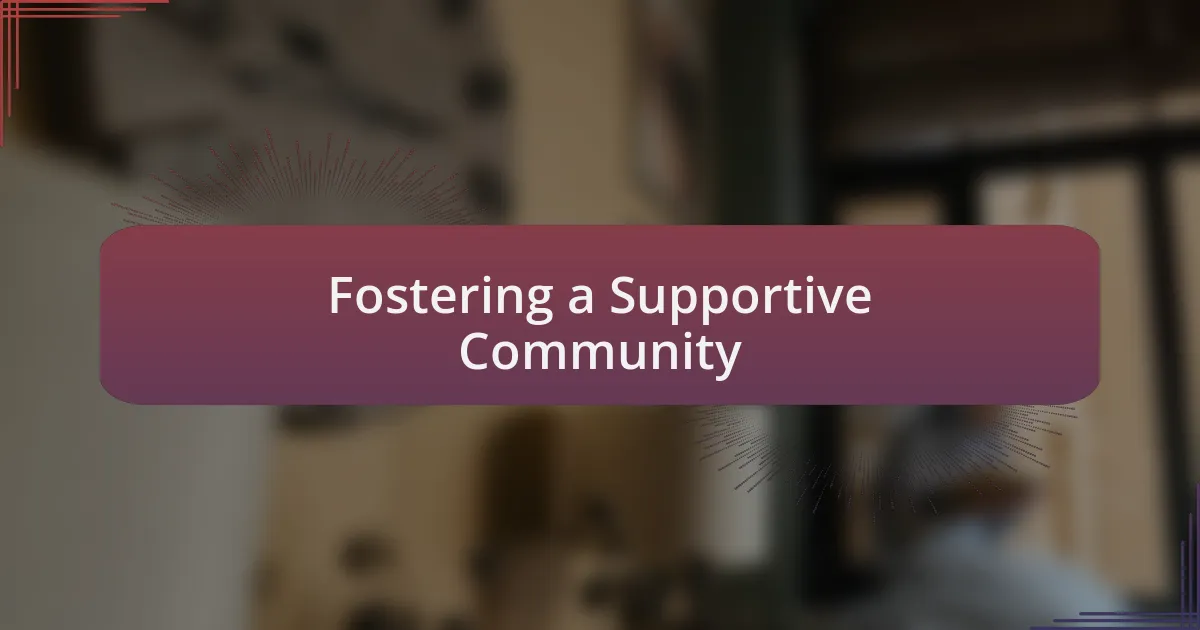
Fostering a Supportive Community
Creating a supportive community can be a game-changer for writers grappling with imposter syndrome. When I joined a local writing group, the shift was immediate. We gathered weekly to share our drafts and struggles, and each session left me feeling a little lighter as we celebrated our small victories together. Have you ever noticed how sharing your fears can make them feel less daunting?
As I listened to others articulate their anxieties, I began to realize that my own insecurities were not unique. One afternoon, a fellow member spoke openly about her self-doubt while reading an excerpt from her work. The vulnerability in her voice resonated deeply with me, prompting a discussion that felt like a warm embrace of understanding. It made me think: how often do we hide behind our insecurities instead of revealing the shared humanity in our creative journeys?
Building connections with other writers has truly enriched my experience and helped combat the isolation that often accompanies self-doubt. I remember one poignant moment when we collectively shared our worst rejection letters, a cathartic practice that transformed our shame into laughter. It dawned on me that embracing our struggles together not only nurtures creativity but fosters resilience. Have you considered how your own authenticity can inspire those around you?
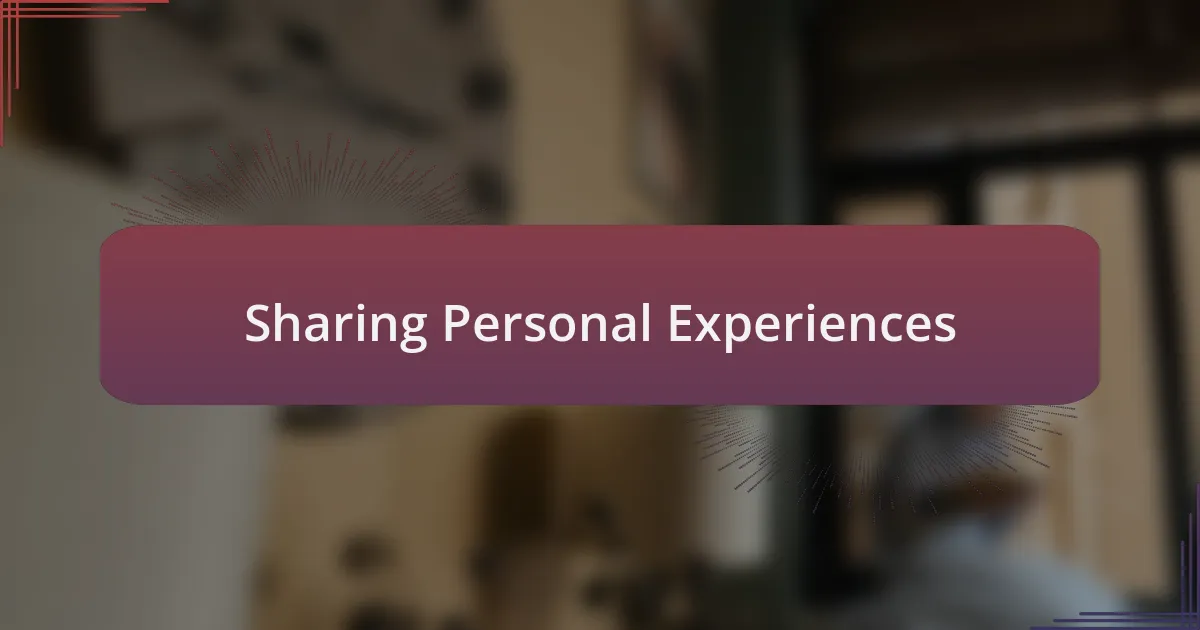
Sharing Personal Experiences
There was a time when I hesitated to share my work with anyone, fearing the criticism that might follow. I remember finally mustering the courage to read a short story at an open mic night. As I shared my story, I felt vulnerable and exposed, but the supportive nods and encouraging comments from the audience were like a warm blanket on a cold day. It made me wonder: how can a simple act of sharing turn an anxious moment into a celebration of creativity?
One day, I decided to open up about my own struggle with imposter syndrome during a writing workshop. As I expressed my feelings of inadequacy, I saw other faces light up with understanding. It was in that moment I realized that vulnerability can breed connection. Have you ever experienced that shift when sharing your doubts led to camaraderie?
Reflecting back, there was a powerful moment when someone in the group shared their journey of overcoming rejection. They spoke of how each setback fueled their determination, and it struck a chord with me. Listening to their story inspired me to see my own experiences in a new light. Can sharing our journeys not only uplift us but also create bridges between our individual experiences?
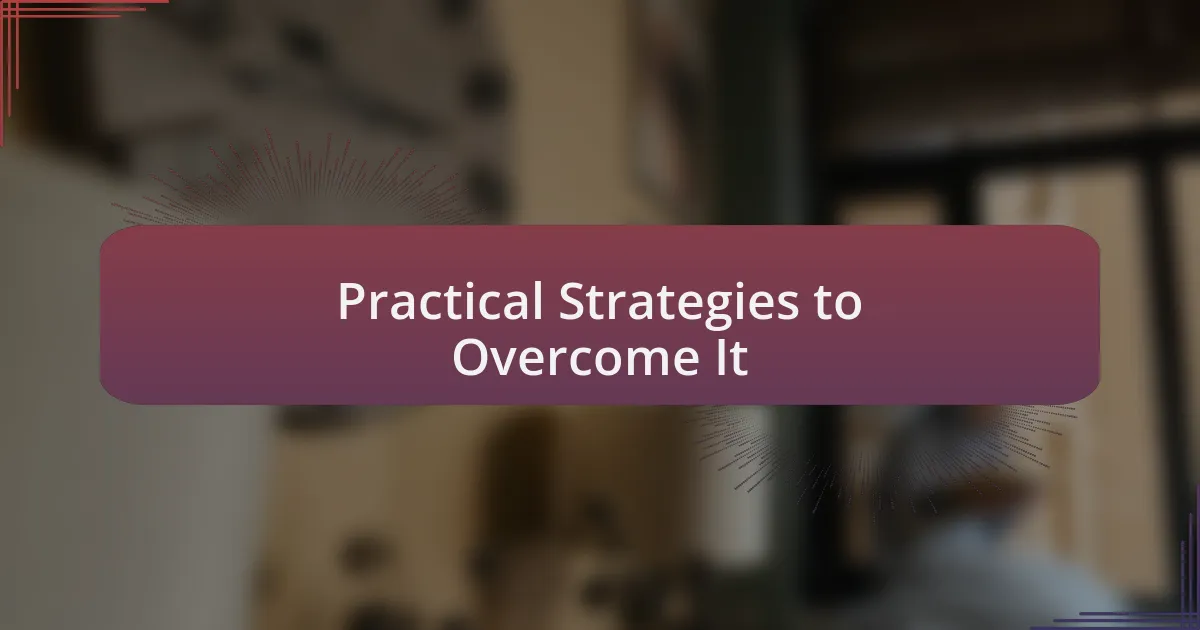
Practical Strategies to Overcome It
One effective strategy I found to combat imposter syndrome is the practice of setting small, achievable goals. In one of my writing projects, I committed to writing just 300 words each day. At first, it felt intimidating, but as I consistently hit that target, my confidence grew. Have you ever noticed how accomplishing a small task can set off a domino effect of motivation?
Another approach that worked wonders for me was seeking feedback from trusted peers. I remember sending a draft of my manuscript to a friend without second-guessing myself. Their constructive comments not only improved my work but also helped me realize that criticism isn’t a reflection of my self-worth. Does seeking out an external perspective help to ground you in reality?
Lastly, I embraced the idea of self-compassion. I used to berate myself for not being “good enough,” but I shifted my focus to acknowledging my efforts. I began journaling about my achievements, no matter how small, which helped reinforce my value. It makes me wonder: how often do we forget to celebrate our journey amidst our self-doubt?
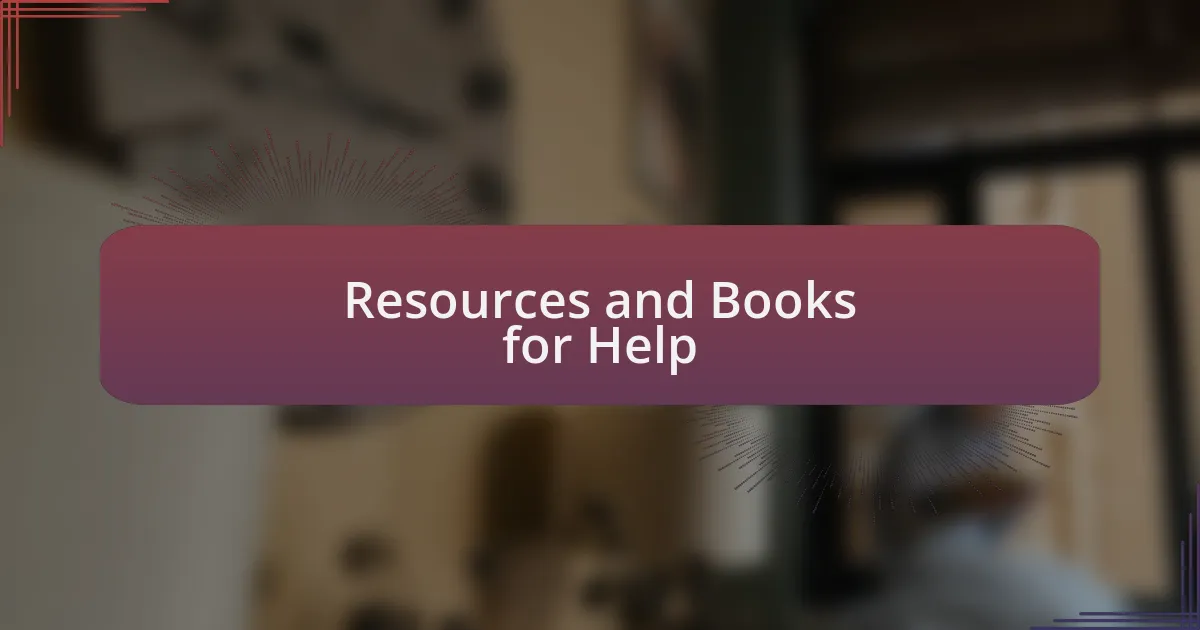
Resources and Books for Help
When it comes to tackling imposter syndrome, books can be a powerful ally. One title that resonated with me is “The Gifts of Imperfection” by Brené Brown. Her exploration of vulnerability and self-acceptance felt like a warm embrace during my toughest moments. Have you ever found comfort in the words of someone who understands your struggle?
Another excellent resource is “You Are a Badass” by Jen Sincero. I remember reading this book during a particularly uncertain phase in my career. Sincero’s encouraging tone and relatable anecdotes pushed me to take bold steps, reminding me that everyone experiences doubt. Questions like “What’s holding me back?” became my mantra, driving me to push through and embrace my authentic self.
Additionally, engaging with online resources like podcasts or forums can provide ongoing support. I’ve found that listening to discussions around imposter syndrome helps normalize my experiences. Have you tried connecting with a community of like-minded individuals? It’s amazing how sharing our stories can foster a sense of belonging and diminish those feelings of inadequacy.